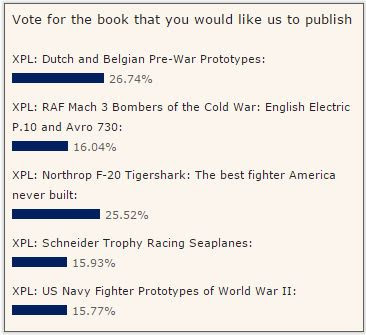3 Jul 2017
June 2017 Book Vote
This month's book vote has been all about our X-Planes series.
Dutch and Belgian Pre-War Prototypes
As Europe headed towards war, and countries large and small began to rearm, aircraft companies in the vulnerable Low Countries designed a new generation of fighters to defend their homelands. These designs, by Fokker, Koolhoven, De Schelde and Renard, included some advanced and innovative aircraft, including a radical push-pull twin-engined fighter, a mid-engined design, and a twin-boom pusher. This is the story of the aircraft that the Luftwaffe might have faced as they pushed west in 1940.
RAF Mach 3 Bombers of the Cold War: English Electric P.10 and Avro 730
In the early 1950s, before North American designed the XB-70 Valkyrie bomber, the RAF had issued specifications for a similarly advanced high-altitude, Mach 3 reconnaissance bomber. Two firms proposed futuristic aircraft that would provide the blistering performance required by the Cold War Bomber Command. Avro’s Type 730 was a massive stainless-steel aircraft powered by the most powerful turbojets available while English Electric, pushing the state of the art, produced the futuristic and technically advanced ramjet-powered P.10. However, both fell prey to the 1957 Defence White Paper and the Avro 730 prototype that was being built was cut up for scrap.
Northrop F-20 Tigershark: The best fighter America never built
A competitor to the F-16 in the early 1980s, the F-20 was an advanced, Mach 2-capable multirole fighter. It was privately funded by Northrop, based on their F-5 series, but equipped with a modern engine, advanced radar and avionics, and capable of using most of the USAF’s 1980s weaponry, including Maverick, Sidewinder and Sparrow missiles. As capable as the early F-16 but significantly simpler and cheaper, it was intended for export to US allies – but fell victim to politics, and none were ever sold. The F-20 remains one of the most intriguing what-ifs of modern aviation.
Schneider Trophy Racing Seaplanes
From 1913 to 1931, the prestige of winning the Schneider Trophy spurred the development of a series of high-performance racing aircraft, which by the late 1920s were already topping 300 mph. Streamlined, elegant, and powered by inline liquid-cooled engines, they were the bloodline for some of the greatest single-engined fighters of World War II. Most famously, Supermarine and Macchi used their Schneider Trophy expertise to develop the Spitfire and C.202 Folgore, but the American Curtiss firm also won twice, once with ‘Jimmy’ Doolittle in the cockpit.
US Navy Fighter Prototypes of World War II
This is the story of how American aircraft-makers responded to the challenges of war and new technology, and the aircraft that the US Navy missed out on, including the Grumman XF5F Skyrocket, Bell XFL Airabonita, Boeing XF8B, Curtiss XF14C, Vought XF5U, and Ryan Fireball. These aircraft include an innovative long-range multirole fighter, a very capable and distinctive twin-engine fighter, and the US Navy’s first mixed-power fighter, which although it entered service just before the end of the war never saw combat.
With five excellent ideas vying for your vote, it's going to be a close one! To read more about this month's options and to see last month's results, click here!
Osprey Publishing Ltd
Subscribe to:
Post Comments (Atom)

No comments:
Post a Comment